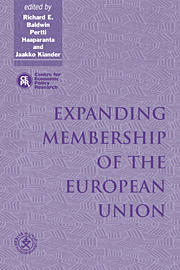Book contents
- Frontmatter
- Contents
- List of figures
- List of tables
- Preface
- Acknowledgements
- List of conference participants
- 1 Introduction
- PART ONE THEORETICAL ISSUES
- PART TWO POLICY ISSUES
- PART THREE EMPIRICAL ISSUES
- 8 Regional effects of European integration
- 9 Implications of EU expansion for European agricultural policies, trade and welfare
- 10 The economic consequences of EU enlargement for the entrants: the case of Finland
- Index
9 - Implications of EU expansion for European agricultural policies, trade and welfare
Published online by Cambridge University Press: 05 November 2011
- Frontmatter
- Contents
- List of figures
- List of tables
- Preface
- Acknowledgements
- List of conference participants
- 1 Introduction
- PART ONE THEORETICAL ISSUES
- PART TWO POLICY ISSUES
- PART THREE EMPIRICAL ISSUES
- 8 Regional effects of European integration
- 9 Implications of EU expansion for European agricultural policies, trade and welfare
- 10 The economic consequences of EU enlargement for the entrants: the case of Finland
- Index
Summary
Introduction
One of the thorniest issues that arises when there are discussions on reducing governmental barriers to economic integration concerns agriculture. This is true whether the negotiations are intra-national (between states or provinces), minilateral (as with free-trade areas or customs unions involving a small number of countries), or multilateral (as with the GATT-based trade negotiations), and is certainly evident in past and present negotiations to expand the number of full or associate members of the European Union (EU). The issue arises because while virtually all countries have interventionist farm policies, the levels and types of assistance provided vary markedly between countries. In the case of EU expansion, the member countries of the current European Free-Trade Association (EFTA), for example, have provided substantially higher levels of support to their farmers than was the case in the EU-12. On the other hand, even the most advanced of the former socialist countries of Eastern and Central Europe provide levels of farm assistance that on average are substantially lower than those in the EU.
In seeking to examine the likely effects on European food markets and on economic welfare of EFTA member countries joining the EU later this decade, and of the more advanced East European countries' access to EU markets being extended for farm products, it is helpful to proceed in two stages: first, to examine the effects of integration assuming Common Agricultural Policy (CAP) prices are adopted by the new entrants, and second, in the light of those projections, to consider what modifications to agricultural policies are likely in the transition to, and following, enlargement.
- Type
- Chapter
- Information
- Expanding Membership of the European Union , pp. 209 - 239Publisher: Cambridge University PressPrint publication year: 1995
- 7
- Cited by



